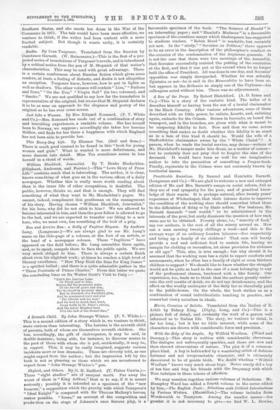Practicable Socialism. By Samuel and Henrietta Barnett. (Longmans and Co.)—We
are glad to welcome a new and enlarged edition of Mr. and Mrs. Barnett's essays on social reform, full as they are of real sympathy for the poor, and of practical know- ledge of their wants. It is perhaps natural, after twenty years' experience of Whitechapel, that their intense desire to improve the condition of the working class should somewhat blind them to the difficulties of doing so by State action. For instance, Mr. Barnett demands "vast wealth" to be administered in the interests of the poor, but airily dismisses the question of how such sums are to be obtained. Poverty alone, i.e., "scarcity of food," Bay our authors, is the root of all the misery around us. How can a man earning twenty shillings a week—and this is the average wage of an ordinary London labourer—live respectably and bring up a family of six children P That sum will barely provide a roof and sufficient food to sustain life, leaving no margin for clothing or recreation, let alone provision for sickness or old age." This, alas, is true enough; but why should it be assumed that the working man has a right to expect comforts and amusements, when he often has a family of eight or even thirteen children to support ? We should like to know whether the struggle would not be quite as hard in the case of a man belonging to any of the professional classes, burdened with a like family. Our experience, too, leads us to think that the authors greatly under- rate the evil results of drink, we do not say drunkenness, and the effect on the weekly exchequer of the daily tax so cheerfully paid to the public-house. On the whole, the book strikes us as a combination of sound individualistic teaching in practice, and somewhat viewy socialism in ideals.


















































 Previous page
Previous page